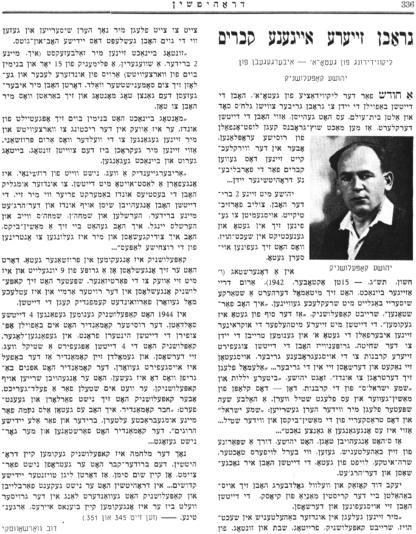Previous Page |
Next Page

[Page 336]
Digging their own graves
The liquidation of Ghetto A – reported by Yehoshua Kapelushnick
[photo:] Yehoshua Kapelushnick
A month before the liquidation of Ghetto A, the Germans ordered the Jews to dig ditches between the priest's garden and the old cemetery. They told the Jews that these ditches were for protection in the event of bombings by Russian airplanes. In fact, however, these were graves for the surviving Jews of Drohitchin.
For their own safety Yehoshua and his two brothers avoided being in the ghetto, and spent the night in the slaughterhouse located outside the ghetto. One Thursday, on October 15, 1942, around 3:00 am, there was loud shooting and screaming. According to Kapelushnick, he believed this was the end of the ghetto. The Germans and their Ukrainian collaborators attacked the ghetto and led the Jews to the slaughter. The Germans led groups of their Jewish victims, who were naked, to the ditches. They were then shot in the ditches. Suddenly, reported Kapelushnick, there was bitter wailing and recitations of “Hear O Israel” by the victims. This was followed by the clatter of machine-gun fire and then silence. Half an hour later we again heard screams of “Hear O Israel,” the clatter of machine-gun fire and silence. This went on all night.
At daybreak, reported Yehoshua, through a crack in his hideout he could see Berl Laufer's daughter, Sarah-Itka, running from the ghetto. The Germans shot at her and killed her. Yaakov David Kozak and Velvel Goldberg were hiding with the Christian Manya from the kiosk. The Germans found them and shot them.
“We stayed in our hideouts at the slaughterhouse,” writes Kapelushnick “on Friday, Saturday and Sunday. From time to time we would hear shooting, and saw the gentiles carrying off Jewish property. On Sunday night the six of us (my two brothers, a brother-in-law, a nephew of 15 year old, Binyamin Baum f Vartsevich and I) left our hideout and headed into the Somenishch Forest, where we stayed the whole night and discussed our next move.
“Monday night Binyamin Baum left, heading in the direction of Vartsevich, and the rest of us headed for the forests around Pruzhany. This is how we lived until the following Sunday. We stopped during the day, and moved at night. There was a truck of Germans traveling along the road near Ruzhinoy. Unfortunately the savages noticed us before we noticed them. They started shooting at us and killed my brothers Hershele and Simcha, Simcha's wife and Hershel's child. I had a machine-gun and shot back, and we were able to escape from the paws of the beasts.”
Kapelushnick got to the Pruzhany ghetto. He joined up with a group of nine young men and made his way to the partisans. Later, he joined the Red Army and was wounded several times in battles against the Germans. In 1944 Kapelushnick captured four German soldiers. The Russian commander ordered him to take the Germans to a POW camp behind the front. He took them a short distance and shot them; he reported to his commander that he had carried out his order. The commander apparently realized that something had happened, and started yelling at Kapelushnick that he would put Kapelushnick on trial at a military field court. However, Kapelushnick held his own and responded, “Comrade commander, I did this as revenge for my murdered parents, siblings and all Jewish victims.” The commander understood and did not say anything further.
After the war, Kapelushnick arrived in Drohitchin. He found the mass grave was not fenced in, and without any sign that there were thousands of Jewish martyrs buried there. He could not remain in Drohitchin, and wandered through the world until he got to Buenos Aires, Argentina. (see pp. 345 and 351).
Dov Warshavsky
Previous Page |
Next Page
This material is made available by JewishGen, Inc.
and the Yizkor Book Project for the purpose of
fulfilling our
mission of disseminating information about the Holocaust and
destroyed Jewish communities.
This material may not be copied,
sold or bartered without JewishGen, Inc.'s permission. Rights may be
reserved by the copyright holder.
JewishGen, Inc. makes no representations regarding the accuracy of
the translation. The reader may wish to refer to the original material
for verification.
JewishGen is not responsible for inaccuracies or omissions in the original work and cannot rewrite or edit the text to correct inaccuracies and/or omissions.
Our mission is to produce a translation of the original work and we cannot verify the accuracy of statements or alter facts cited.
 Drogichin, Belarus
Drogichin, Belarus
 Yizkor Book Project
Yizkor Book Project
 JewishGen Home Page
JewishGen Home Page
Yizkor Book Director, Lance Ackerfeld
This web page created by Lance Ackerfeld
Copyright © 1999-2024 by JewishGen, Inc.
Updated 4 Dec 2001 by LA

 Drogichin, Belarus
Drogichin, Belarus
 Yizkor Book Project
Yizkor Book Project
 JewishGen Home Page
JewishGen Home Page